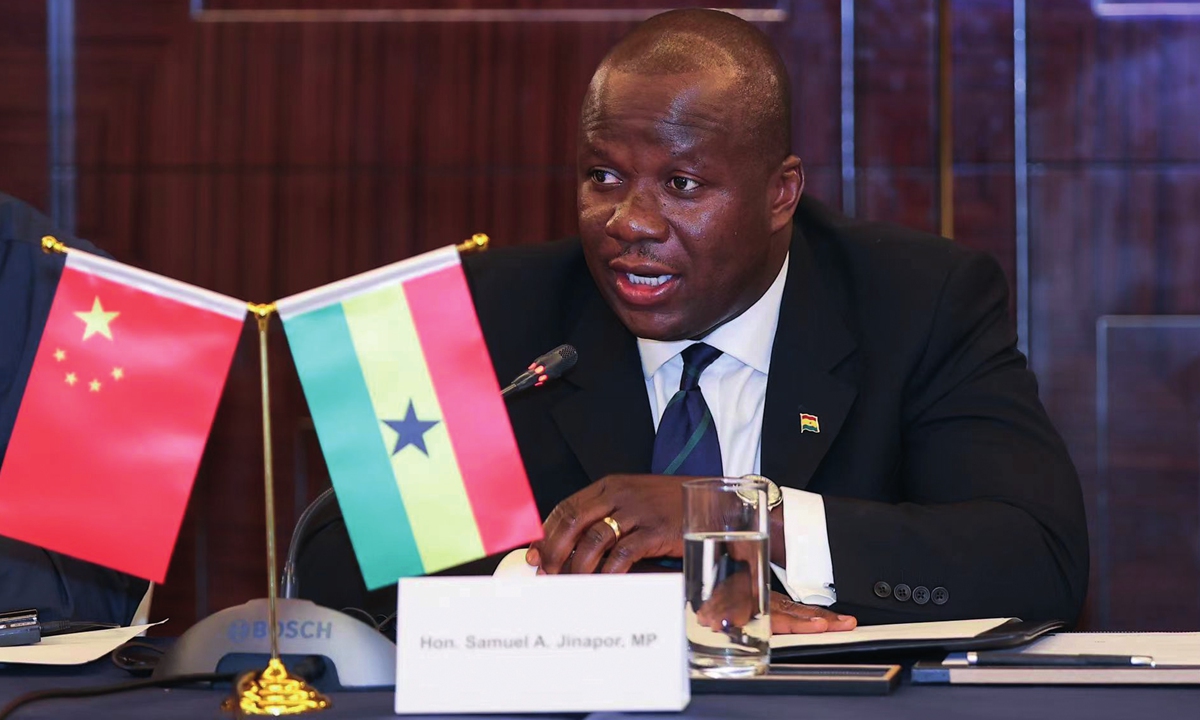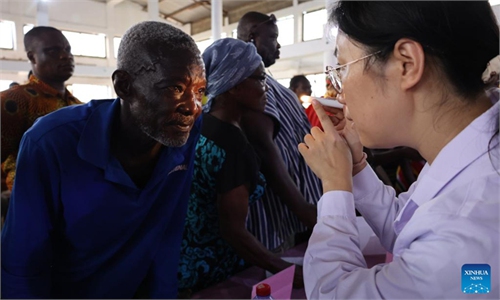A senior Ghanaian official visit China seeking to deepen cooperation on mining, eyeing Chinese technology to make mining industry greener in Ghana

Ghanaian Minister for Lands and Natural Resources Samuel Abu Jinapor. Photo: Zhao Yusha/GT
Ghanaian Minister for Lands and Natural Resources embarked on a trip to China this week, eyeing to deepen collaboration with China on full chain of mining, from mining to downstream industry, whilst hoping Chinese technology can assist Ghana to make its mining industry greener.
Minister for Lands and Natural Resources Samuel Abu Jinapor arrived in China on Monday. Jinapor told the Global Times in an exclusive interview on Tuesday that his agenda consists of visiting Chinese private firms and meeting with Chinese investors in Shandong, Shanghai and other Chinese cities.
"The overarching agenda is to deepen our collaboration and involvement with the Chinese government, the Chinese private sector and generally, Ghana-China relations as it relates to the mining sector of our country," Jinapor said.
According to Economic and Commercial Office of the Embassy of the China in Ghana, Ghana has a variety of green mineral resources, including lithium, graphite, chromium, zinc, copper, cobalt and nickel, with high-grade lithium found particularly in the central region.
China is Ghana's largest trading partner and a major source of investment. It has implemented numerous investment projects, for example, China's Shandong Gold Mining Co. Ltd. which has completed its takeover of Ghana-focused gold mine developer Cardinal Resources Ltd. via the previously announced all-cash offer of $221 million in 2021.
When meeting with Jinapor in May in May this year, Chinese ambassador to Ghana Lu Kun expressed gratitude for Ghana's support for Chinese companies' participation in the development of Ghana's mining industry and vowed to encourage more Chinese companies to invest in Ghana.
Jinapor told the Global Times that China's cooperation with Ghana in the mining industry carries a twofold meaning. The first is in the large-scale mining industry. "The Chinese involvement in Ghanaian large-scale mining sector is enormous," said Jinapor, noting that Chinese investors, such as China's Shandong Gold Mining Co. Ltd., are contributing tremendously to the Ghanaian mining industry as well as helping Ghana raise revenue out of mining.
He also pointed out that such cooperation is significant when it comes to the small mining industry. As small-scale mining is reserved exclusively for Ghanaians, China is cooperating with Ghana to root out illegal participation of Chinese in Ghana's small mining industry, said Jinapor.
Chinese embassy in Ghana in 2019 issued a warning to Chinese nationals saying that it is illegal for Chinese citizens to engage in small-scale gold mining in Ghana. Chinese companies and personnel in Ghana should strictly abide by local laws and regulations, and refrain from participating in illegal gold mining and related activities, it said.
The Ghanian minister also said China and Ghana enjoy great potential in making the mining industry greener.
"The world is going toward green, and whatever industry we build today has to be built on a sustainable manner and done in a manner that doesn't contribute to climate change…So Chinese technology is very useful and Chinese technology is proving to contribute to halting climate change," said Jinapor.
According to a report titled China Mineral Resources complied by China's Ministry of Natural Resources in 2022, there are more than 1,100 national-level green mines in China. In 2020, China was planned to develop 50 green mines into demonstration zones. Since the construction of green mines, it has played a great role in promoting the conservation and efficient utilization of resources, ecological rehabilitation and governance, and building a harmonious relationship between mining communities, and contributed to the ecological civilization construction in the mining industry in practice.
In the past, the traditional power supply system gave rise to problems such as uneven load of power consumption and waste of clean power, while smart energy systems such as the virtual power plant can integrate and optimize the fragmented load resources to improve power efficiency.
Win-win cooperation
This year marks the 10th anniversary of the China-proposed Belt and Road Initiative (BRI). Many African countries are major collaborators with China under the framework, and mining carries significant weight in such cooperation.
The race to acquire minerals is becoming more intense globally as key minerals such as lithium and cobalt are essential to electric vehicle (EV) manufacturers, an area in which China is taking the lead.
Jinapor emphasized that despite the growing competitiveness of the global mining industry, the future for China's cooperation with Ghana is bright.
"We're looking for investment in the large scale mining industry where foreign investment is welcome, lawful and mutually beneficial. And we're looking for investment in the full value chain of the industry from exploration to mining, to refining, to downstream industry, all the linkages of the various value chains of the mineral resource of our country," said Jinapor, noting that he is looking forward to working closely with Chinese investors and the private sector to ramp up their involvement and investment in the full value chain of large scale mining in Ghana.
However, the US is keeping a close eye on China's cooperation with African countries in the mining industry. In 2019, the Washington Post published an article hyped that China's cooperation with Africa on bauxite mine could cause water pollution in Ghana.
The Economist described mining in African as a "new contest between the US and China," in an article published in February 2023. "We cannot allow China to become an OPEC of one in critical minerals," says an American official, referring to the oil cartel, the magazine reported.
Through the BRI, Chinese companies have invested in infrastructure construction and mine exploration in Africa. Although the US is concerned that China will become "the OPEC of key minerals," and Washington, as a latecomer, does not have a competitive edge in the domain in Africa. The best the US can do is "show up," said Song Wei, a professor with School of International Relations and Diplomacy, Beijing Foreign Studies University.
On the other hand, the US' demand for Africa to take sides [amid China-US competition] has aroused strong resentment among African countries, Song noted.
For Jinapor, what matters most is what the Ghanaian government cares most about, which is to bring about prosperity and economic development to its people. They are achieving this through cooperation with many parties, including China. "Chinese investment is playing a critical role in the mining industry in Ghana," he said.



